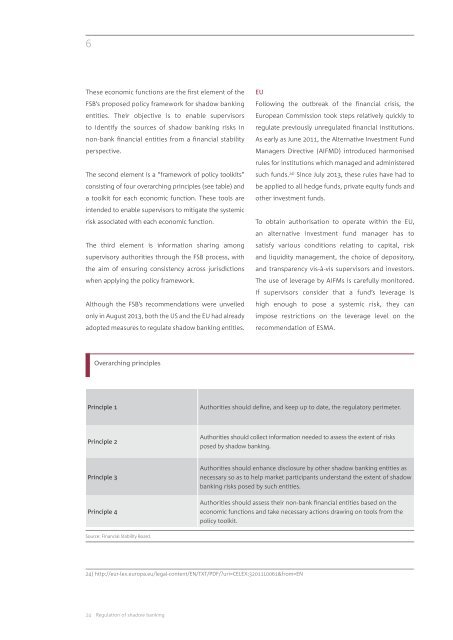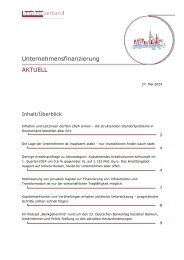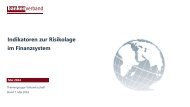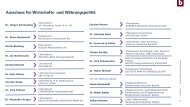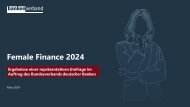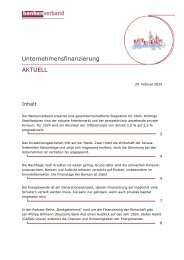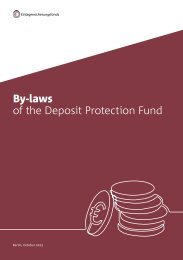Regulation of shadow banking
Shadow banking is given a large share of the blame for the financial crisis. This perception raises the question of what kind of shadow banking system should remain in place in the future.
Shadow banking is given a large share of the blame for the financial crisis. This perception raises the question of what kind of shadow banking system should remain in place in the future.
You also want an ePaper? Increase the reach of your titles
YUMPU automatically turns print PDFs into web optimized ePapers that Google loves.
6<br />
These economic functions are the first element <strong>of</strong> the<br />
FSB’s proposed policy framework for <strong>shadow</strong> <strong>banking</strong><br />
entities. Their objective is to enable supervisors<br />
to identify the sources <strong>of</strong> <strong>shadow</strong> <strong>banking</strong> risks in<br />
non-bank financial entities from a financial stability<br />
perspective.<br />
EU<br />
Following the outbreak <strong>of</strong> the financial crisis, the<br />
European Commission took steps relatively quickly to<br />
regulate previously unregulated financial institutions.<br />
As early as June 2011, the Alternative Investment Fund<br />
Managers Directive (AIFMD) introduced harmonised<br />
rules for institutions which managed and administered<br />
The second element is a “framework <strong>of</strong> policy toolkits”<br />
consisting <strong>of</strong> four overarching principles (see table) and<br />
a toolkit for each economic function. These tools are<br />
intended to enable supervisors to mitigate the systemic<br />
risk associated with each economic function.<br />
such funds. 24) Since July 2013, these rules have had to<br />
be applied to all hedge funds, private equity funds and<br />
other investment funds.<br />
To obtain authorisation to operate within the EU,<br />
an alternative investment fund manager has to<br />
The third element is information sharing among<br />
supervisory authorities through the FSB process, with<br />
the aim <strong>of</strong> ensuring consistency across jurisdictions<br />
when applying the policy framework.<br />
Although the FSB’s recommendations were unveiled<br />
only in August 2013, both the US and the EU had already<br />
adopted measures to regulate <strong>shadow</strong> <strong>banking</strong> entities.<br />
satisfy various conditions relating to capital, risk<br />
and liquidity management, the choice <strong>of</strong> depository,<br />
and transparency vis-à-vis supervisors and investors.<br />
The use <strong>of</strong> leverage by AIFMs is carefully monitored.<br />
If supervisors consider that a fund’s leverage is<br />
high enough to pose a systemic risk, they can<br />
impose restrictions on the leverage level on the<br />
recommendation <strong>of</strong> ESMA.<br />
Overarching principles<br />
Principle 1<br />
Authorities should define, and keep up to date, the regulatory perimeter.<br />
Principle 2<br />
Authorities should collect information needed to assess the extent <strong>of</strong> risks<br />
posed by <strong>shadow</strong> <strong>banking</strong>.<br />
Principle 3<br />
Principle 4<br />
Authorities should enhance disclosure by other <strong>shadow</strong> <strong>banking</strong> entities as<br />
necessary so as to help market participants understand the extent <strong>of</strong> <strong>shadow</strong><br />
<strong>banking</strong> risks posed by such entities.<br />
Authorities should assess their non-bank financial entities based on the<br />
economic functions and take necessary actions drawing on tools from the<br />
policy toolkit.<br />
Source: Financial Stability Board.<br />
24) http://eur-lex.europa.eu/legal-content/EN/TXT/PDF/?uri=CELEX:32011L0061&from=EN<br />
24 <strong>Regulation</strong> <strong>of</strong> <strong>shadow</strong> <strong>banking</strong>


